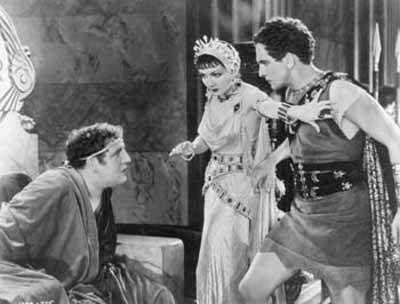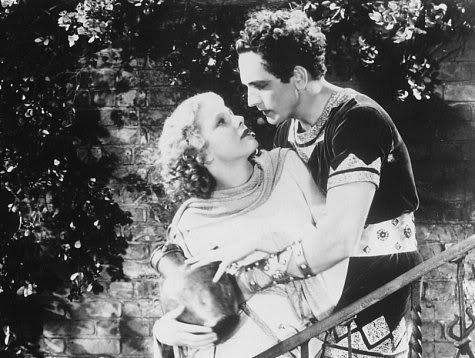 The Sign of the Cross is Cecil B. DeMille's 1932 parable about the corrupt Roman Emperor Nero, and the virtuous Christians persecuted by Nero. Charles Laughton (on the left in the photo) plays Nero, who is so corrupt that, as the proverb goes, he fiddled while Rome burned. Actually, he strums his lyre, but the point is made right at the beginning of the movie. And the point is made quite bluntly: the pagan Romans are dreadfully immoral and full of every vice known to man (and probably invented a bunch of vices, too), while DeMille's Christians are the apotheosis of God's perfection of virtuousity. Frankly: I'm understating DeMille's vision of first-century AD Rome: never let it be said that Cecil B. DeMille was subtle in his movie-making! Claudette Colbert (in the middle) plays Nero's wife, and she gets one of the more extravagant and entertaining vices in the movie. But we'll get to the vice and moral corruption in detail later.
The Sign of the Cross is Cecil B. DeMille's 1932 parable about the corrupt Roman Emperor Nero, and the virtuous Christians persecuted by Nero. Charles Laughton (on the left in the photo) plays Nero, who is so corrupt that, as the proverb goes, he fiddled while Rome burned. Actually, he strums his lyre, but the point is made right at the beginning of the movie. And the point is made quite bluntly: the pagan Romans are dreadfully immoral and full of every vice known to man (and probably invented a bunch of vices, too), while DeMille's Christians are the apotheosis of God's perfection of virtuousity. Frankly: I'm understating DeMille's vision of first-century AD Rome: never let it be said that Cecil B. DeMille was subtle in his movie-making! Claudette Colbert (in the middle) plays Nero's wife, and she gets one of the more extravagant and entertaining vices in the movie. But we'll get to the vice and moral corruption in detail later.
The main plot-line of the story involves a Roman prefect, played by Fredric March (on the right in both photos), who has as part of his job the responsibility for persecuting those poor Christians. Until one day, when he meets one of the Christians, of the young, nubile, female sort, played by Elissa Landi (seen here with March).  Naturally, March falls in love with Landi -- this is a Hollywood movie, after all -- but he simply can't figure out why she doesn't return the favor. Indeed, she's just so darn virtuous all the time, yet unprepossessing about it. The illicit love of a Roman prefect for one of those Christians will of course lead to tragedy, when it comes time to persecute the Christians by feeding them to the lions, and a whole bunch of other forms of torture. Meanwhile, poor Fredric March can't figure out why Landi is more willing to go to her death than to be with a virile thing like him.
Naturally, March falls in love with Landi -- this is a Hollywood movie, after all -- but he simply can't figure out why she doesn't return the favor. Indeed, she's just so darn virtuous all the time, yet unprepossessing about it. The illicit love of a Roman prefect for one of those Christians will of course lead to tragedy, when it comes time to persecute the Christians by feeding them to the lions, and a whole bunch of other forms of torture. Meanwhile, poor Fredric March can't figure out why Landi is more willing to go to her death than to be with a virile thing like him.
This love story is obviously what's in it for the women. (Well, perhaps women of the day found the idea of March in his short tunic, showing off his legs, sexy. After all, women are just as sex-obsessed as us guys.) What's in it for the guys is the moral vice. In order to show Christian virtue triumphing over vice, Cecil B. DeMille shows an unbelievable amount of vice. The aforementioned Claudette Colbert gets one of the most famous scenes, as she bathes naked in a bath of goat's milk, and asks one of her lady servants to join her. (DeMille is alleged to have done dozens of takes of the bath scene, as he wanted to get Colbert's nipples on film, but every time she got out of the bath, there was a stagehand with a strategically-positioned towel blocking DeMille's shot.)
Meanwhile, Landi's young nephew gets captured by the Romans, and yields the location of the meeting of the Christians in a scene where he gets tortured -- and it looks as though his torturers are getting aroused over whipping his sweaty, half-naked adolescent body. And that's not the only form of sex the Romans are imposing on the Christians. When Landi still won't fall for March's self-styled charms after the Christians are arrested, but before they're sent to their gladiatorial death, March assumes that there must be something wrong with her. After all, nobody can possibly be that virtuous! So what does March do? He tempts Landi -- with a lesbian dance!
Then there's the execution. Those poor Christians are humiliated with stabbings, crushings, and implied bestiality, too. It's as though the only thing that can stop DeMille is the limitations on his own imagination. After all, you can never have too much debauchery in your Christian stories!
A Last Hurrah?
5 hours ago

No comments:
Post a Comment